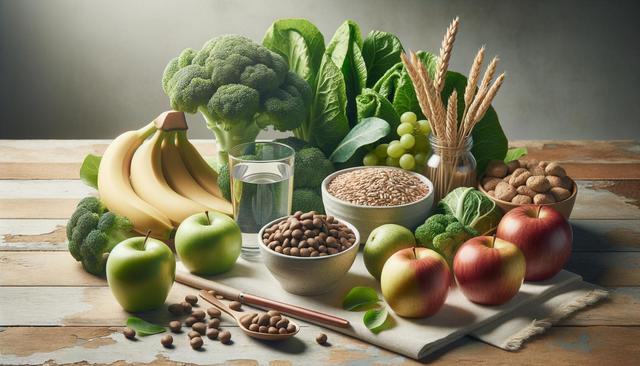Understanding Constipation and Dietary Triggers
Constipation occurs when bowel movements become infrequent or difficult to pass, often due to a lack of dietary fiber, dehydration, or a sedentary lifestyle. Before diving into the foods that can help, it’s important to understand what might be causing this digestive slowdown. Diet plays a pivotal role. Highly processed foods, dairy-heavy meals, and low-fiber diets can contribute to constipation. Similarly, inadequate fluid intake and low physical activity levels can worsen the condition. Making small changes to your eating habits can lead to noticeable improvements in bowel regularity.
Fiber is essential because it adds bulk to the stool and helps it pass more easily through the digestive tract. There are two types of fiber: soluble and insoluble. Both are important, but insoluble fiber, in particular, helps to move waste through the intestines. Adding more fiber-rich foods, coupled with ample hydration, can help restore balance and ease discomfort.
Fruits That Support Digestive Health
Many fruits are naturally high in fiber and water, both of which are crucial for relieving constipation. They also contain natural sugars like sorbitol, which have mild laxative effects. For instance:
- Apples: Rich in soluble fiber, especially when eaten with the skin.
- Pears: Contain a good amount of fiber and sorbitol, which can help regulate bowel movements.
- Prunes: Often recommended for their high content of fiber and sorbitol, known for their stool-softening effects.
- Kiwi: Contains actinidin, an enzyme that promotes digestion along with fiber and vitamin C.
Including these fruits in your daily meals or as snacks can provide gentle, natural relief from constipation. Fresh fruit is generally preferable to juice, as juicing often removes much of the beneficial fiber. However, prune juice is an exception as it retains enough sorbitol to be effective.
Whole Grains and Fiber-Rich Carbohydrates
Whole grains are another excellent source of dietary fiber. Unlike refined grains, whole grains retain the bran and germ, which are rich in nutrients and fiber. Incorporating these into your meals can provide sustained digestive support. Examples include:
- Oats: A versatile option rich in soluble fiber that helps soften stool.
- Brown rice: Contains both insoluble and soluble fiber, promoting regular bowel function.
- Whole grain bread and pasta: Offer more fiber compared to their white counterparts.
- Quinoa: High in protein and fiber, making it a nutritious, gut-friendly grain.
Switching from refined grains to whole grains doesn’t require a dramatic diet overhaul. Small swaps, like choosing whole grain toast over white bread or brown rice instead of white, can gradually improve your digestive health. Pairing grains with fiber-rich vegetables enhances their effectiveness even further.
Vegetables and Legumes for Digestive Support
Vegetables and legumes are packed with both soluble and insoluble fiber, making them essential for relieving constipation. Leafy greens and cruciferous vegetables, in particular, are powerful digestive aids. Consider adding the following to your meals:
- Broccoli: Contains both fiber and sulforaphane, which may protect the gut lining.
- Spinach and kale: Rich in fiber, magnesium, and water, all beneficial for bowel health.
- Carrots and sweet potatoes: Offer a balanced mix of fiber and natural sugars.
- Lentils, chickpeas, and black beans: High in fiber and protein, they support gut motility.
Legumes, while nutrient-dense, should be introduced gradually into your diet, especially if you’re not used to high-fiber foods, to avoid bloating. Cooking them thoroughly and drinking plenty of water can help offset any initial digestive discomfort. These plant-based foods can be easily added to soups, salads, or main dishes to boost fiber intake without much hassle.
Hydration and Additional Helpful Tips
While fiber is essential, it needs water to work effectively. Without adequate hydration, fiber can actually contribute to constipation by hardening the stool. Drinking enough fluids—ideally water—helps keep the digestive system moving. Aim for at least 8 cups of water per day, and more if you’re increasing your fiber intake.
In addition to water, other beverages that can support digestion include:
- Herbal teas, such as peppermint or ginger tea, which can soothe the digestive tract.
- Warm lemon water in the morning, which may help stimulate bowel movements.
- Clear broths, which provide hydration and electrolytes.
Physical activity also plays a role. Even light exercise, like walking, can stimulate intestinal activity. Creating a regular routine for meals and bathroom visits may help train your body’s digestive rhythm. Paying attention to your body’s cues and not delaying the urge to go can also prevent constipation from developing or worsening.
Conclusion: A Gentle Approach to Digestive Relief
When it comes to relieving constipation, dietary choices are among the most effective and sustainable strategies. By incorporating fiber-rich fruits, vegetables, whole grains, and legumes, while staying properly hydrated, you can support your digestive system naturally. These changes don’t require dramatic shifts—small, consistent adjustments can lead to noticeable improvements. Remember that every body is different, so finding the combination of foods that works for you may take a little time, but it’s a worthwhile step toward better gut health and overall well-being.


